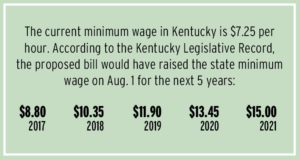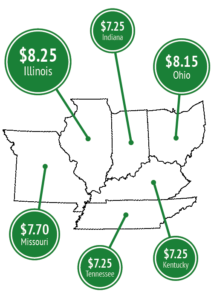Story by Lindsey Coleman, Staff writer
A bill that would increase the minimum wage rate in Kentucky was unable to make it past committees in the Kentucky General Assembly this month.

“HB 178 is effectively dead for the 2017 session of the Kentucky General Assembly,” Rep. Kenny Imes said.
After the bill was introduced on Feb. 7 in the Kentucky House, Imes said it was assigned to the Economic Development and Workforce Investment Committee. He said the bill has had no committee hearings since then.
As the days dwindled down near the end of the session, Imes said there was no way the bill could pass both the House and Senate.
“Personally, I believe that raising the minimum wage will effectively artificially raise the cost of goods or services provided in the marketplace,” Imes said.
He said the minimum wage worker and all consumers would be paying for the higher costs.
“Further, if an individual wants to make more money, they have ample opportunity to do so by having a good work ethic and avail themselves with the many countless opportunities for more education and/or training for skilled, dedicated and committed workers,” Imes said.
Associate professor of economics, Eran Guse said the bill was “doomed to fail.”
As a small business owner himself, Guse said raising the minimum wage across the board in Kentucky could be beneficial for some, but not all, namely small business owners. He and his wife own Wild Mountain Bakery in Murray.
He said business could slow down, entrepreneurs could choose not to open a small business and students might not find jobs to support their schooling.
“It could be devastating,” Guse said.
Sophomore economics major from Murray, Brendan Parker said increases in the cost of living caused by inflation haven’t been offset by a raised minimum wage.
“A raise in the minimum wage would be a good way to keep earnings rising with the cost of living,” Parker said.
However, Parker said raising the minimum wage could have a negative effect on some businesses and on Murray State, which would face more budget concerns.
According to the National Conference of State Legislatures, 19 states began 2017 with higher minimum wages than previous years, although surrounding states that have increased their state minimum have strayed only a dollar away from the $7.25 federal minimum wage mark.




























































































